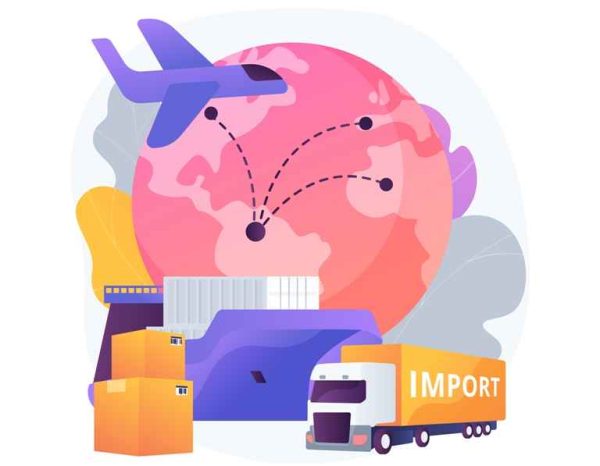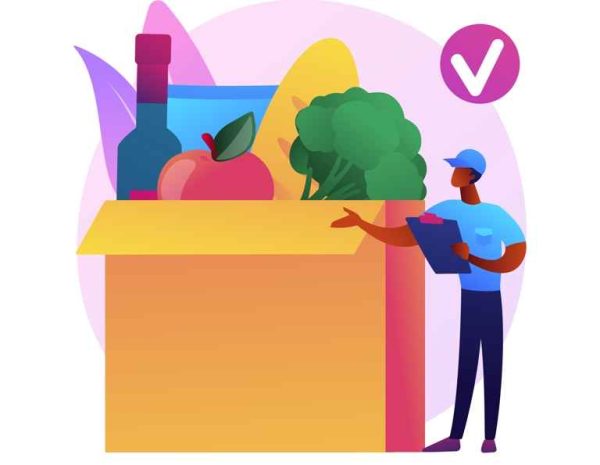The United Kingdom boasts a rich tapestry of culinary delights, but for those looking to import foods from outside the UK, navigating customs regulations is a crucial aspect of the process.
UK Customs Food Restrictions play a pivotal role in ensuring the safety and compliance of imported food products.
There are rules for bringing food into the UK for your personal use. Bringing animals, plants, and food into the UK, is a process of quickly checking the items while you are thinking of importing any of these products.
Before going forward, you need to check the details of the products that you might bring to the UK in your luggage.
After a great holiday, when you arrive at the airport there will be a great hurdle to getting through customs checks.
Whenever you will step towards customs, you will get two options for exit. One is the green channel if you don’t have any restricted items then you can use this exit.
Otherwise, if you have any prohibited items or carrying commercial goods, etc. then you have to use the exit.
In this guide, we will delve into the essential information that importers must remember to streamline the importation of foods into the UK.
Table of Contents
Understanding Regulatory Authorities:
Before delving into specific restrictions, it’s essential to understand the regulatory landscape.
The primary authority overseeing food safety in the UK is the Food Standards Agency (FSA), which sets and enforces safety and hygiene standards.
The Animal and Plant Health Agency (APHA) also plays a significant role, particularly concerning the importation of animal and plant products.
Key Considerations for Importers:

Product Certification and Documentation:
Importers must ensure that their food products comply with UK regulations and standards. This often requires obtaining the necessary certifications, such as health certificates, from the relevant authorities in the exporting country.
Proper documentation, including invoices and labelling information, is critical for smooth customs clearance.
Restricted and Prohibited Items:
The UK maintains a list of restricted and prohibited food items. Importers should familiarize themselves with this list, which includes items like raw milk, certain types of games, and products containing certain food colourings and additives.
Understanding these restrictions helps prevent costly delays and rejections at customs.
Allergens Declaration:
The UK has stringent regulations regarding allergen information on food labels. Importers must ensure that their products comply with these regulations, clearly declaring any allergens present in the food.
Failure to do so may result in non-compliance and potential legal consequences.
Pesticide Residue Limits:
The UK has established maximum residue limits (MRLs) for pesticides in food products. Importers must ensure that their products meet these limits to avoid rejection at customs.
Regular testing and verification of compliance are advisable.
Biological and Chemical Hazards:
Imported food products must not pose a threat to public health.
Importers must adhere to regulations regarding biological and chemical hazards, ensuring that their products are free from contaminants, toxins, and harmful microorganisms.
Temperature and Storage Requirements:
Certain food products, especially perishables, have specific temperature and storage requirements.
Importers must ensure that these conditions are maintained during transportation and storage to guarantee the safety and quality of the imported goods.
Customs Duties and Taxes:
In addition to complying with food safety regulations, importers must be aware of customs duties and taxes applicable to their products.
Familiarizing themselves with the UK’s tariff schedule helps in accurate cost estimation.
What you can bring into the UK without restrictions:
There are different rules of the UK customs if you are bringing foods or animal products into Northern Ireland. But, you can bring the following items into the UK without any restrictions:
- Bread but not sandwiches filled with dairy products or meat.
- Biscuits
- Cakes
- Pasta or noodles, but there is a restriction if it is filled with meat or meat products.
- Confectionary and chocolate; but not for that made with a lot of unprocessed dairy products.
- Packaged soups, stocks, and flavourings.
- Any food supplement contains a small portion of animal products such as fish oil capsules.
- Packaged and processed plant products such as salad, or any frozen plant material.
UK customs food restrictions

There are restrictions on bringing meat, fish, animal products, and dairy products as well as fruits, nuts, seeds, and vegetables into Great Britain from abroad.
- Meat, dairy, fish, and animal products:
The regulations on bringing meat, animal products, fish, and dairy products depend on the country from where you are bringing them.
From Switzerland, EU, Norway, Iceland, Faroe Islands, Greenland, and Liechtenstein:
You can import the following items for personal use:
- Fish
- Dairy
- Meat (restriction on 2kgs of pork or pork items)
- Other animal products such as honey and eggs
If you are bringing any animal product then it must be commercially packaged with the name and address of the feed business operator.
From countries outside the EU:
If you are importing food items from any country except Switzerland, EU, Norway, Iceland, Greenland, Faroe Island, or Liechtenstein; then the following rules will be applied:
You cannot bring in:
- Milk or milk products except for powdered infant milk, pet food, infant food, or any special food needed for any medical issues.
- Meat or meat products
You can bring up to 2kgs per person of:
- Powdered infant milk, special food, infant food, pet food
- honey,
- shellfish
- snails must be preserved or shelled, cooked or prepared
- frogs legs; these must be the back portion of the frogs and the internal parts must be removed
- insect meat
You can bring in 20kg per person in a total of fish; containing:
- fresh fish
- fish products
- processed fish- must be cooked, smoked, dried, and curried
- lobsters
- prawns
- Fruits, vegetables, seeds, and nuts:
The restrictions of the UK customs on fruits, vegetables, nuts, and seeds depend on the country from where you are bringing the items.
From the EU, Switzerland, and Liechtenstein:
You can bring in the following items for personal use:
- Fruits
- Vegetables
- Nuts
- Seeds
From the other countries outside the EU:
You cannot bring most of the fruits and vegetables without having a phytosanitary certificate for them. You can only bring the following without having the certificate.
- Coconut
- Pineapple
- Kiwi
- Kumquat
- Citrus fruits such as lemons, oranges, limes, and grapefruits
- Durian
- Persimmon
- Banana and plantain
- Mango
- Dates
- Curry leaves
- Passion fruit
- Guava
- Processed and packaged plant products such as salad, or frozen plant material
- Processed nuts and nuts butter
- Grains such as rice
- Alcohol and Tobacco
Without paying duty or tax, you can bring the following into the UK without any restrictions:
You can bring both
- Beer-42 liters
- Wine-18 litres (not sparking)
You can bring in either:
- Spirits and other liquors with 22% alcohol- 4 litre
Or
- Fortified wine, alcoholic drinks, sparkling wine up to 22 % alcohol-9 litre
If you intend to bring tobacco into the UK then you can bring one of the following items:
- 200 cigarettes
- 100 cigarettes
- 250 gms of tobacco
- 50 cigars
Check if you require a CITES permit:
You must apply for permission to import-export, or re-export any food, plant animal, or a dead animal or a part of it that is listed by the Convention on International Trade in Endangered Spices of Wild Fauna and Flora (CITES).
This includes:
- Food such as eel fillets and caviar
- Any beauty product including caviar extract
- Edible cacti
To apply, you can download the CITES form and send it to the address on the form.
While you are travelling to the UK you will need to reach one of the airports or ports that handle CITES items.
If you don’t have CITES permission, then the borders may seize your items and they would think that you are bringing these items illegally into the country.
If you don’t obey the restrictions:
If the Border Force officers at Customs declare that you are bringing banned food products then immediately they will take them away from you and destroy them.
If you do not have state-banned food products, you will be prosecuted.
Border Force can take away your food products if they think:
- You have brought restricted food items illegally into the country.
- You have brought in a huge amount of the restricted food items.
- It is been cross-contaminated such as the blood of the animal. If they find any item in the bag is contaminated they will destroy it.
FAQ-
Can I bring ghee from India to the UK?
Ans- Yes. Ghee is permitted in checked luggage while venturing out to the UK from India. However, it is dependent upon specific limitations. You must be aware of how much ghee you are permitted to carry in transit. A few carriers might permit up to 1 kg of ghee, while others might have stricter limitations.
Can I bring dried fish to the UK?
Ans: Yes, you are allowed to bring up to 20 kg combined weight per person of fish and fish products. Fish can be dried, smoked, cooked, or processed but fresh fish is only permissible if gutted.
Can I carry olive oil into the UK for personal use?
Ans: While bringing olive oil into the UK for personal use you need to fit a tamper-proof seal to the container of the pure olive oil at the bottling stage. You need to be sure that the sealed container is not larger than 5 litres.
What foods are usually allowed to bring to the UK?
Ans: You are allowed to bring in some of the food items into the UK such as bread, chocolate, confectionery, pasta, noodles, biscuits, cakes, packaged and processed plant products, any food supplement containing a smaller portion of animal products, etc.
Wrap Up:
I have covered all the relevant information you need to know before planning to bring food products from foreign countries into the UK. But you also can go through for more details look the Personal Import Rules Database.
These comprehensive tools will provide you with details information regarding restrictions on food products by country. There are hundreds of food products that you can bring into the UK or send by online ordering.













